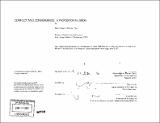Conflict and convergence : a proposition in Lisbon
Author(s)
Morais-Storz, Marta Angelica
DownloadFull printable version (21.83Mb)
Other Contributors
Massachusetts Institute of Technology. Dept. of Architecture.
Advisor
Shun Kanda.
Terms of use
Metadata
Show full item recordAbstract
The built environment's neutrality as response to diversity has proven inadequate and at times catastrophic. In a world of increasingly permeable borders it is no longer possible to design for a nostalgic image of a homogenous mode of living. Globalization has created cities of the uprooted and the disenfranchised. The neutrality approach of the design of living spaces has continued to stigmatize those who inhabit them, promoting xenophobia, and oppression. Yet this newfound ultra-transience is not a passing phenomenon, but rather a permanent effect of increased mobility, and therefore must be accounted for in future designs. Can the revitalization of urban housing be found in the idiosyncrasies, both social and spatial, in a redefinition of boundaries, public and private, less as obstacles and more as connections, and in dialectic between the ordered and the ambiguous? For architecture, and specifically housing, to go beyond its mode of self-reference it necessitates a paradigm shift of dictated neutrality to that of an ordered disorder. This implies an architecture of multiplicity. One which promotes variety and little constraint to change, yet is also ambiguous enough to be defined and re-defined by the act of dwelling. ITaking the city as an exemplary structure which over time has supported various strata of diversity, social and physical, this project attempts to serve as simulacra of a city, providing the carcass that can support the strata created in time. As such, it may serve as tool of empowerment and catalyst for urban xenophilia.
Description
Thesis (M. Arch.)--Massachusetts Institute of Technology, Dept. of Architecture, 2007. Includes bibliographical references (p. 107-109).
Date issued
2007Department
Massachusetts Institute of Technology. Department of ArchitecturePublisher
Massachusetts Institute of Technology
Keywords
Architecture.